一般疑问句和特殊疑问句习题
英语一般疑问句和特殊疑问句专项训练
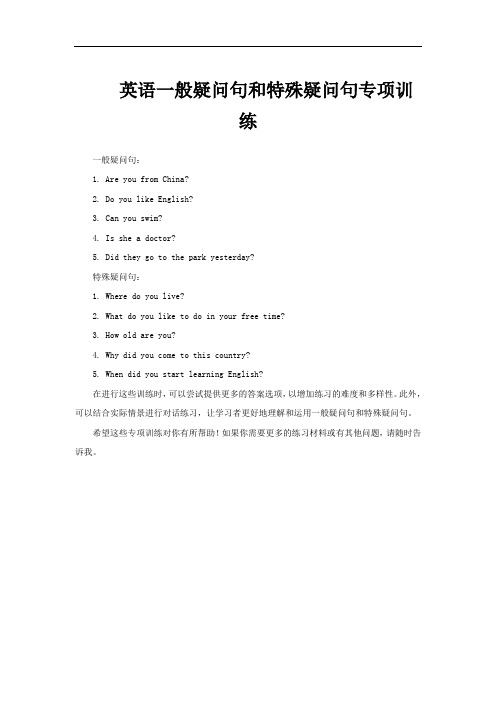
英语一般疑问句和特殊疑问句专项训
练
一般疑问句:
1. Are you from China?
2. Do you like English?
3. Can you swim?
4. Is she a doctor?
5. Did they go to the park yesterday?
特殊疑问句:
1. Where do you live?
2. What do you like to do in your free time?
3. How old are you?
4. Why did you come to this country?
5. When did you start learning English?
在进行这些训练时,可以尝试提供更多的答案选项,以增加练习的难度和多样性。
此外,可以结合实际情景进行对话练习,让学习者更好地理解和运用一般疑问句和特殊疑问句。
希望这些专项训练对你有所帮助!如果你需要更多的练习材料或有其他问题,请随时告诉我。
一般疑问句和特殊疑问句及练习题
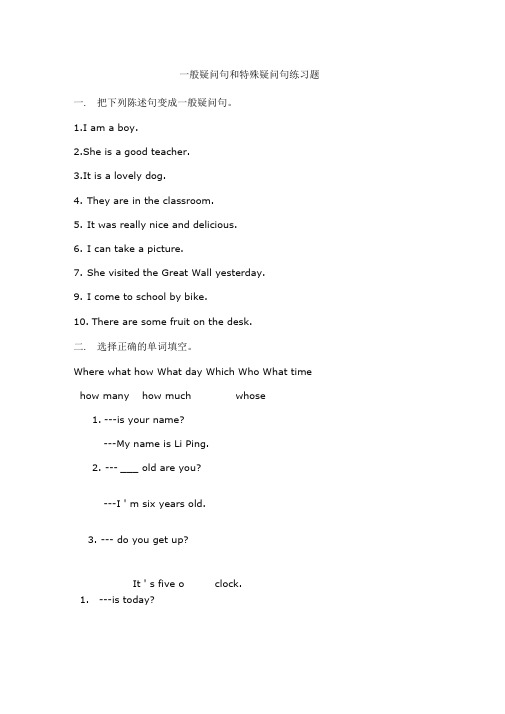
一般疑问句和特殊疑问句练习题一. 把下列陈述句变成一般疑问句。
1.I am a boy.2.She is a good teacher.3.It is a lovely dog.4.They are in the classroom.5.It was really nice and delicious.6.I can take a picture.7.She visited the Great Wall yesterday.9.I come to school by bike.10.There are some fruit on the desk.二. 选择正确的单词填空。
Where what how What day Which Who What time how many how much whose1.---is your name?---My name is Li Ping.2.--- ___ old are you?---I ' m six years old.3.--- do you get up?It ' s five o clock.1.---is today?---Today is Monday. 2.--one do you like best?--I like the black one. 3.—is she?---She is my teacher.4.---are you going?--- I ' m going to the store.5.--- are you!---I ' m fine.6.--- is it?--- It ' s five o ' clock.10. ---do you get here?---By bus.11.---are they?---They are 80 yuan.12.---books do you have?---I have two books13.---room is this?--- It ' s room.三. 对划线部分提问.1.I am going to Shanghai.2.My father will take me to Beijing.3.I went to here by bus.4.We send some beautiful flowers to our teacher.I 一般疑问句和特殊疑问句一.一般疑问句能用Yes或No回答的疑问句叫一般疑问句。
一般疑问句和特殊疑问句及练习题

一般疑问句和特殊疑问句练习题一.把下列陈述句变成一般疑问句。
1.I am a boy.2.She is a good teacher.3.It is a lovely dog.4. They are in the classroom.5. It was really nice and delicious.6. I can take a picture.7. She visited the Great Wall yesterday.9. I come to school by bike.10. There are some fruit on the desk.二.选择正确的单词填空。
Where what how What day Which Who What time how many how much whose1. ---____ is your name?---My name is Li Ping.2. ---____ old are you?---I’m six years old.3. --- ______ do you get up?---It’s five o’clock.1.---________ is today?--- Today is Monday.2. --_______ one do you like best?-- I like the black one.3.--- ____is she?--- She is my teacher.4.---______ are you going?--- I’m going to the store.5.--- ____ are you!---I’m fine.6.--- _____ is it?--- It’s five o’clock.10. ---_____ do you get here?--- By bus.11.---_________are they?--- They are 80 yuan.12. ---_______books do you have?--- I have two books13. ---______ room is this?--- It’s _____ room.三.对划线部分提问.1. I am going to Shanghai.2. My father will take me to Beijing.3. I went to here by bus.4. We send some beautiful flowers to our teacher.I 一般疑问句和特殊疑问句一.一般疑问句能用Yes或No回答的疑问句叫一般疑问句。
小学一般疑问句和特殊疑问句练习题1

句型练习题一、将以下句子改为一般疑问句.1. His father is an English teacher.2. These cats are crying.3. They can swim.4. I like to read English.5. His father goes to work by bus.6. His birthday is on the twentieth of November.7. Mrs. Li and Kitty are in a big shop.8. The boy under the tree is hungry.9. He goes to school every day.10. She wants a cup of coffee.11. Mrs. Li and Kitty watch television at night.12.I do my homework after school二、就画线部分提问1.He is my father.2.They are under the tree.3.I often watch TV after dinner.4.Lily swims in the swimming pool.(游泳池)5.Superman flies in the sky.6.I often brush my teeth in the evening.7.Alan likes to play with Bill.8.Joe's father plays badminton(羽毛球) every weekend.9.The supermarket is near the school.10.My grandpa took us to the zoo.二.连线:(Match)1. What’s on the chair? A. There is a book in the bag.2. How is your father? B. These are apples.3. What are these? C. I go to school by bus.4. What is in the bag? D. The radio is on the chair.5. How do you go to school? E. My father is fine.6. How much is it? F. I wash my face in the morning.7. What time is it? G. I have two hands.8. When do you wash your face? H. It is fouro’clock.9. How many hands do you have? I. It is 5 RMB(人民币).10.When do you have lunch? J. I have lunch at noon.。
一般疑问句和特殊疑问句---习题
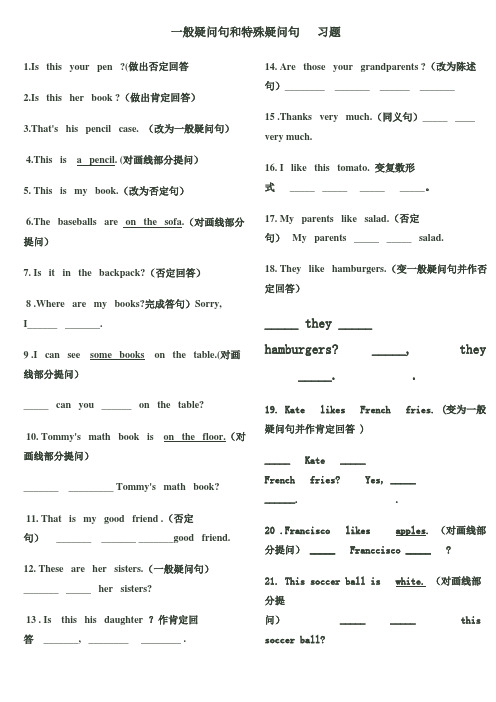
一般疑问句和特殊疑问句习题1.Is this your pen ?(做出否定回答2.Is this her book ?(做出肯定回答)3.That's his pencil case. (改为一般疑问句)4.This is a pencil. (对画线部分提问)5. This is my book.(改为否定句)6.The baseballs are on the sofa.(对画线部分提问)7. Is it in the backpack?(否定回答)8 .Where are my books?完成答句)Sorry,I______ _______.9 .I can see some books on the table.(对画线部分提问)_____ can you ______ on the table?10. Tommy's math book is on the floor.(对画线部分提问)_______ _________ Tommy's math book?11. That is my good friend .(否定句)_______ _______ _______good friend.12. These are her sisters.(一般疑问句)_______ _____ her sisters?13 . Is this his daughter ?作肯定回答_______, ________ ________ . 14. Are those your grandparents ?(改为陈述句)________ _______ ______ _______15 .Thanks very much.(同义句)_____ ____ very much.16. I like this tomato. 变复数形式_____ _____ _____ _____。
一般疑问句和特殊疑问句 (附练习题及答案

How do you go home?
On foot.
how old
多大
问年龄
How old is he?
6 years old.
how many
多少
问数量
How many books are there in the bookcase?
There are 10.
how much
多少
问价钱
How much is the book?
9. Mrs. Li and Kitty watch television at night.
Do Mrs. Li and Kitty watch television at night? Yes, they do. / No, they don’t.
10. I can finish my homework by myself.
中小学英语一般疑问句和特殊疑问句详解(附练习题及答案)
一、一般疑问句
1、定义:用Yes或No作答的疑问句叫一般疑问句。
2、特点:
1>以be动词am/is/are、助动词do/does、情态动词can/could/may、there be(即there is /are)开头;
例:Is your father a teacher?/ Does Tom like apples? /Can Jenny speak English? /Is there a book on the desk?
There is a book on the desk.→Is there a book on the desk?
2>如果句中没有be动词或情态动词,句首加do的相应形式(do、does、did),且原句的谓语动词要变回原形。
一般疑问句vs 特殊疑问句专项练习题

一般疑问句vs 特殊疑问句1.以什么开头,就以什么结尾。
如:以be开头,就以be结尾。
I s he a teacher? Yes, he is. No, he isn’t. (以be的is 开头)Can he paly basketball? Yes, he can. No, he can’t. (以can开头,以can结尾)Do es she like bananas? Yes, she does. No, she doesn’t. (以does开头)2.注意,一般疑问句在回答时只能用人称代词的主格指代上句中所说的人或物。
三、一般疑问句的变化规则:6个步骤:一找,找be动词;二提,把be动词提到句首;三大小写,句首字母大写,原来大写变小写;四变;把与我有关的变与你有关的(I 变you,my 变your, we变you, our变your, me变you );五抄,原来语序不变抄下来;六符号,句末点号变问号。
练习题:请把下列陈述句变一般疑问句1.He is my teacher(老师). _________________________________________2.I’m fine. _________________________________________3.My quilt is red. _________________________________________练习题:请把下列陈述句变一般疑问句,并作出肯定和否定回答。
回答:yes, 人称代词be/助动词/情态动词.No, 人称代词be/助动词/情态动词+not.(注意:isn’t=is not aren’t=are not,am和not不能缩写)1.Is Tom your brother? _________________________________________2.Are these his cousins? _________________________________________3.Is that boy your friend? _________________________________________4.Is this her ruler? _________________________________________5.Is he Jack? _________________________________________6.Is Helen your aunt? _________________________________________7.Is your father in China? _________________________________________8.Are you a student(学生)?_________________________________________四、特殊疑问句:特殊疑问词+一般疑问句(以be/助动词do,does/情态动词can,may,must开头的句子)1.特殊疑问词:2.要注意问句和回答分别所指的对象和具体的内容,要前后一致。
一般疑问句与特殊疑问句练习

一般疑问句与特殊疑问句一、be动词:am, is, are二、肯定句、否定句、一般疑问句和特殊疑问句定义1.肯定句:表示肯定的意思, 即不含有否定词“不”。
比如:我是一个学生。
I am a student.他去上学。
He goes to school.2.否定句:表示否定的意思。
比如:我不是一个男孩。
I am not a boy他不去上学 He does not go to school.3. 一般疑问句:回答为“是yes”或者“否no”的问句。
比如:你是一个学生吗? Are you a student?你喜欢英语吗? Do you like English?4. 特殊疑问句:回答不是“是yes”或者“否no”的问句,根据提问内容具体回答。
比如:现在几点了?What’s the time?哪一支笔是你的? Which is your pen?三、肯定句、否定句、一般疑问句和特殊疑问句的相互转换有am, is, are的句子肯定句变否定句:在am, is, are后面加上not,其余按顺序照抄。
肯定句变一般疑问句:把am, is, are提前放到句首并大写Am, Is, Are,其余照抄。
肯定句变特殊疑问句(就划线部分提问):分3步骤第一步:先变一般疑问句第二步:找合适的特殊疑问词代替划线部分第三步:特殊疑问词提前放到句首,并大写,其余按顺序照抄,省略划线部分。
注意:1.一定先变一般疑问句。
但是,如果问的是主语或主语的定语时,语序不变,为"特殊疑问词(+主语)+陈述句"。
如:Li ming 's not here today.Who's not here today? 今天谁没来?2.划线部分不能在特殊疑问句中出现。
例如:1 肯定句、否定句和一般疑问句的互换肯定句:This is a book.否定句:This is not a book.一般疑问句:Is this a book?肯定回答:Yes, it is.否定回答:No, it isn’t.2 就划线部分提问(变特殊疑问句)This is a book.第一步:变一般疑问句 Is this a book?第二步:找合适的特殊疑问词 Is this what ?第三步:特殊疑问词提前放到句首,并大写,其余按顺序照抄,省略划线部分。
一般疑问句和特殊疑问句习题
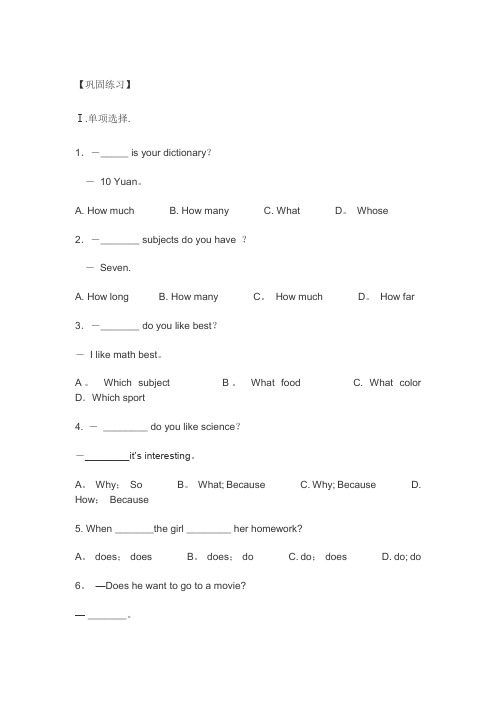
【巩固练习】Ⅰ.单项选择.1.-_____ is your dictionary?-10 Yuan。
A. How muchB. How manyC. What D。
Whose2.-_______ subjects do you have ?-Seven.A. How longB. How many C。
How much D。
How far3.-_______ do you like best?-I like math best。
A。
Which subject B。
What food C. What color D.Which sport4. -________ do you like science?-________it’s interesting。
A。
Why;So B。
What; Because C. Why; Because D. How;Because5. When _______the girl ________ her homework?A。
does;does B。
does;do C. do;does D. do; do6。
—Does he want to go to a movie?— _______。
A. Yes, he does B。
No, he does C. Yes, he doesn’t D。
Yes,she is7. -_______ kind of movies do you like?-I like comedies very much。
A。
What's B。
How C. What D. Why8。
-______ are these bananas?-Five dollars.A. What colorB. How aboutC. How muchD. How many9. -Can we play football in the street?-No, you _____。
小学英语一般疑问句和特殊疑问句(附练习题)
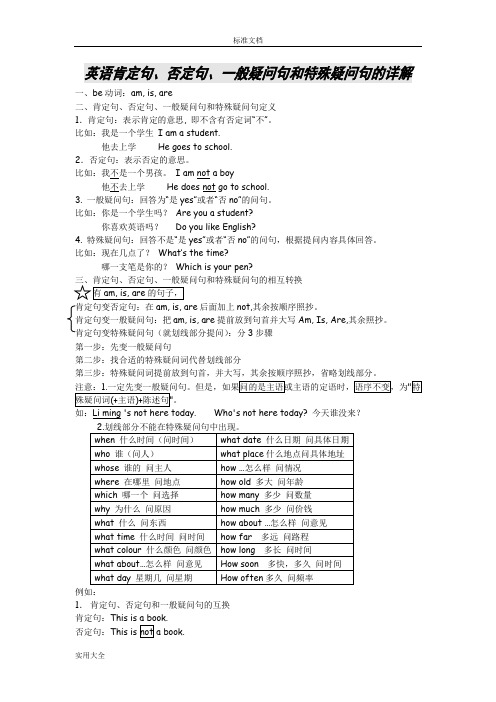
英语肯定句、否定句、一般疑问句和特殊疑问句的详解一、be动词:am, is, are二、肯定句、否定句、一般疑问句和特殊疑问句定义1.肯定句:表示肯定的意思, 即不含有否定词“不”。
比如:我是一个学生I am a student.他去上学He goes to school.2.否定句:表示否定的意思。
比如:我不是一个男孩。
I am not a boy他不去上学He does not go to school.3. 一般疑问句:回答为“是yes”或者“否no”的问句。
比如:你是一个学生吗?Are you a student?你喜欢英语吗?Do you like English?4. 特殊疑问句:回答不是“是yes”或者“否no”的问句,根据提问内容具体回答。
比如:现在几点了?What’s the time?哪一支笔是你的?Which is your pen?am, is, are后面加上not,其余按顺序照抄。
肯定句变一般疑问句:把am, is, are提前放到句首并大写Am, Is, Are,其余照抄。
:分3步骤第一步:先变一般疑问句第二步:找合适的特殊疑问词代替划线部分第三步:特殊疑问词提前放到句首,并大写,其余按顺序照抄,省略划线部分。
如:Li ming 's not here today.Who's not here today? 今天谁没来?例如:1.肯定句、否定句和一般疑问句的互换肯定句:否定句:一般疑问句:Is this a book?肯定回答:Yes, it is.否定回答:No, it isn’t.2.就划线部分提问(变特殊疑问句)This is a book.第一步:变一般疑问句Is this a book?第二步:找合适的特殊疑问词Is this what ?第三步:特殊疑问词提前放到句首,并大写,其余按顺序照抄,省略划线部分。
do not或者does not,其余按顺序照抄动词用原形肯定句变一般疑问句:在句首加do或者does并大写,其余照抄。
小学英语一般疑问句和特殊疑问句(附练习题)
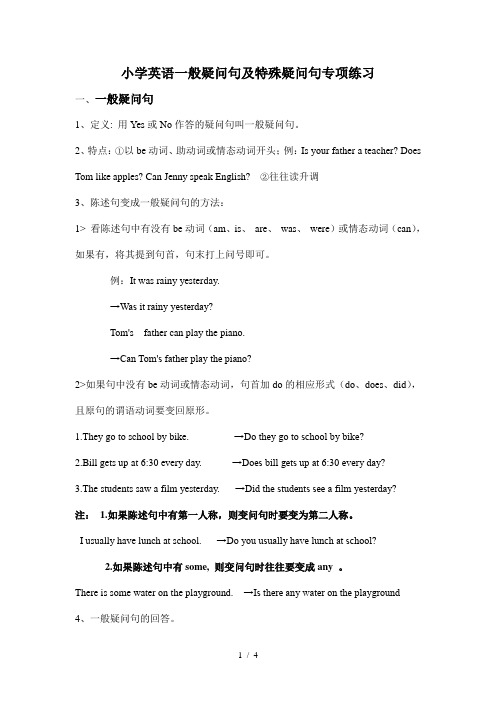
小学英语一般疑问句及特殊疑问句专项练习一、一般疑问句1、定义: 用Yes或No作答的疑问句叫一般疑问句。
2、特点:①以be动词、助动词或情态动词开头;例:Is your father a teacher? Does Tom like apples? Can Jenny speak English? ②往往读升调3、陈述句变成一般疑问句的方法:1> 看陈述句中有没有be动词(am、is、are、was、were)或情态动词(can),如果有,将其提到句首,句末打上问号即可。
例:It was rainy yesterday.→Was it rainy yesterday?Tom's father can play the piano.→Can Tom's father play the piano?2>如果句中没有be动词或情态动词,句首加do的相应形式(do、does、did),且原句的谓语动词要变回原形。
1.They go to school by bike. →Do they go to school by bike?2.Bill gets up at 6:30 every day. →Does bill gets up at 6:30 every day?3.The students saw a film yesterday. →Did the students see a film yesterday?注: 1.如果陈述句中有第一人称,则变问句时要变为第二人称。
I usually have lunch at school. →Do you usually have lunch at school?2.如果陈述句中有some, 则变问句时往往要变成any 。
There is some water on the playground. →Is there any water on the playground4、一般疑问句的回答。
一般疑问句和特殊疑问句_讲解及练习

一般疑问句一、一般疑问句作答的疑问句叫一般疑问句。
其结构是be动词(am /is /are )主语+其他成分Yes,+主语+提问的词.否定:No,+主语+提问的词+not.Are you from Japan﹖Yes ,I am./ No, I'm not.Is her sister doing her homework now﹖Yes, she is./ No, she isn't.Does he work in a bank﹖Yes, he does./ No, he doesn't.Can you speak French﹖Yes, I can./ No, I can't.一般疑问句还有下列特点:1、以be动词、助动词或情态动词开头;例:Is your father a teacher? Does Catherine like animals? Can Jenny speak French?2、2、往往读升调;3、译成汉语,都可以带上“吗”,例如上面三句可分别译为:你父亲是老师吗?凯瑟琳喜欢动物吗?詹妮会说法语吗?二、例何将陈述句变成一般疑问句?1.如句中有be 动词(am、is、are、was、were can、may、must …)或助动词(do、does、did、have、had(完成时中)它们提到句首,句末打上问号即可。
主语为第一人称,应将其改为第二人称。
例:It was rainy yesterday.→Was it rainy yesterday?Tom's father can play the piano.→Can Tom's father play the piano?I have finished my homework.→Have you finished your homework?2.如果句中没有be动词、助动词或情态动词,则根据谓语动词的形式借助do的相应形式放在句首。
一般疑问句和特殊疑问句的练习
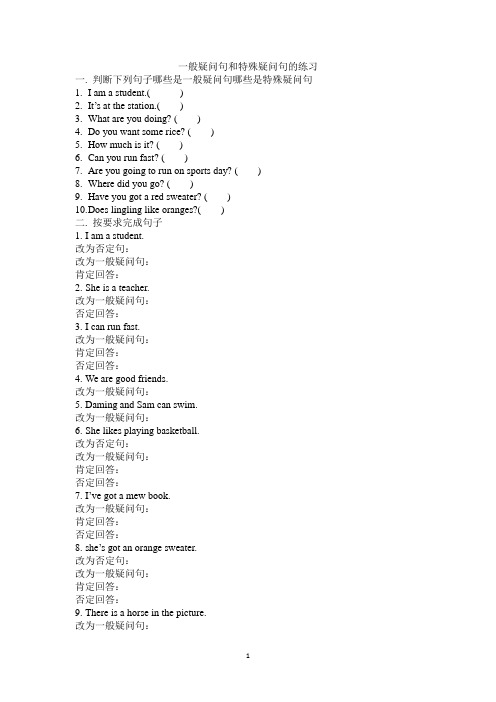
一般疑问句和特殊疑问句的练习一.判断下列句子哪些是一般疑问句哪些是特殊疑问句1.I am a student.( )2.It’s at the station.( )3.What are you doing? ( )4.Do you want some rice? ( )5.How much is it? ( )6.Can you run fast? ( )7.Are you going to run on sports day? ( )8.Where did you go? ( )9.Have you got a red sweater? ( )10.D oes lingling like oranges?( )二.按要求完成句子1.I am a student.改为否定句:改为一般疑问句:肯定回答:2.She is a teacher.改为一般疑问句:否定回答:3.I can run fast.改为一般疑问句:肯定回答:否定回答:4.We are good friends.改为一般疑问句:5.Daming and Sam can swim.改为一般疑问句:6.She likes playing basketball.改为否定句:改为一般疑问句:肯定回答:否定回答:7.I’ve got a mew book.改为一般疑问句:肯定回答:否定回答:8.she’s got an orange sweater.改为否定句:改为一般疑问句:肯定回答:否定回答:9.There is a horse in the picture.改为一般疑问句:肯定回答:否定回答:10.There are for people on the bike. 改为一般疑问句:肯定回答:否定回答:三.对画线部分进行提问1.They’re monkeys.2.I like football.3.This is a pen.4.She’s got an orange sweater.5.That man is short.6.He likes riding bikes.7.It’s red.8.It’s a red pen.9.Amy is reading books.10.They are swimming.11.The little boy is running.12.The little boy is running.13.She goes to school on Mondays.14.She is behind the tree.15.The book is on the desk.16.There are five apples.17.There is half a kilo of cheese.18.It’s five yuan.19.She came back last Sunday.20.She went to school by bus.21.I was 2 then.22.She dropped the ice cream.23.She bought 12 eggs.。
(完整版)六年级英语一般疑问句和特殊疑问句专项.doc
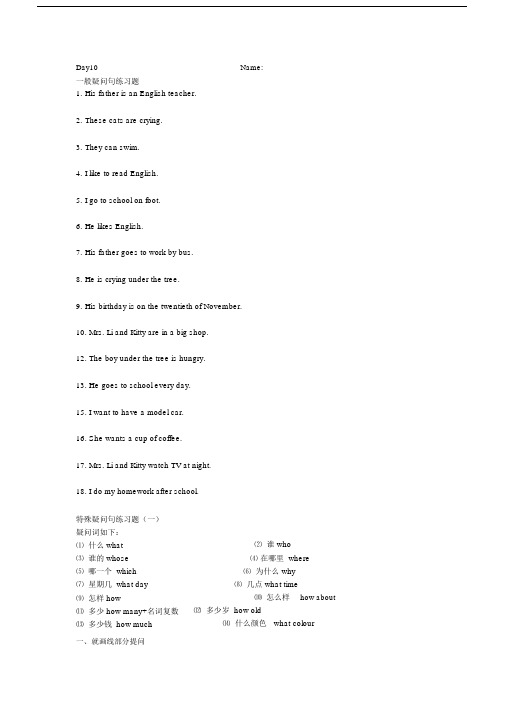
Day10Name: 一般疑问句练习题1.His father is an English teacher.2.These cats are crying.3.They can swim.4.I like to read English.5.I go to school on foot.6.He likes English.7.His father goes to work by bus.8.He is crying under the tree.9.His birthday is on the twentieth of November.10.Mrs. Li and Kitty are in a big shop.12.The boy under the tree is hungry.13.He goes to school every day.15.I want to have a model car.16.She wants a cup of coffee.17.Mrs. Li and Kitty watch TV at night.18.I do my homework after school.特殊疑问句练习题(一)疑问词如下:⑴什么 what⑶谁的 whose⑸哪一个 which⑺星期几 what day⑼怎样 how⑾多少 how many+名词复数⒀多少钱 how much⑵谁 who⑷在哪里 where⑹为什么 why⑻几点 what time⑽ 怎么样how about ⑿多少岁 how old⒁什么颜色what colour一、就画线部分提问1.He is my father.2.They are under the tree.3.I often watch TV after dinner.(晚饭后)提示:饭后强调的是时间问题。
4. Lily swims in the swimming pool.(游泳池)5.I often brush my teeth in the evening.5. Alan likes to play with Bill.7. Joe's father plays badminton(羽毛球) every weekend.8.The supermarket is near the school.9.The computer is on the table.10. The flowers are in the flower pot(花盆).11. My grandpa took us to the zoo.12. The monkey sleeps at night.二、句型转换。
小学英语一般疑问句和特殊疑问句附练习题

汇报人:XX
目录
01 单问句练习题
添加章节标题
小学英语疑问 句类型
一般疑问句
定义:以助动词、情态动词或be动词开头,表示询问事实或观点的疑问 句。 结构:助动词/情态动词/be动词+主语+谓语+其他?
示例:Do you like apples?(你喜欢苹果吗?)
添加 标题
例子:What time does the train arrive?(火车什么时候到达?)
小学英语疑问 句练习题
一般疑问句练习题
Do you like apples? Is this your book? Can you swim? Are you a student?
特殊疑问句练习题
什么是特殊疑问句? 特殊疑问句的结构是什么? 特殊疑问句的常见形式有哪些? 如何回答特殊疑问句?
感谢您的观看
汇报人:XX
练习题:将陈述句改为一般疑问句。
特殊疑问句
添加 标题
定义:特殊疑问句是用来对句子中的某一 特定部分提问的疑问句,通常以“what”、 “when”、“where”、“why”、 “how”等疑问词开头。
添加 标题
结构:特殊疑问句的结构为“疑问词+助 动词+主语+谓语+其他成分”。
添加 标题
用法:特殊疑问句通常用于获取具体信息, 例如询问时间、地点、原因等。
(完整word版)一般疑问句和特殊疑问句练习题
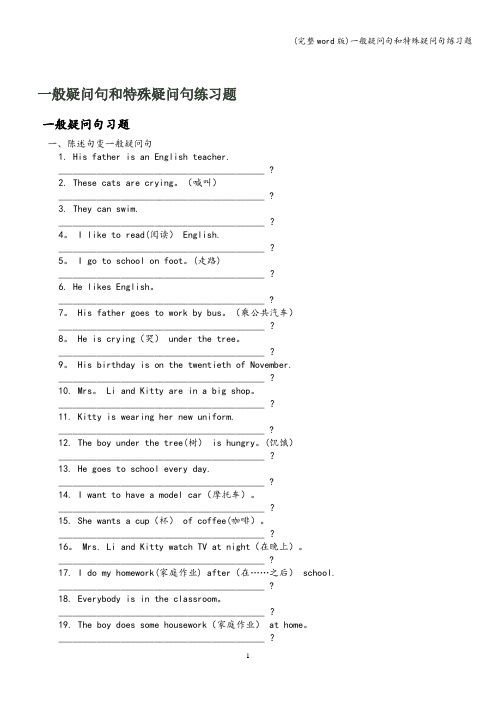
一般疑问句和特殊疑问句练习题一般疑问句习题一、陈述句变一般疑问句1. His father is an English teacher.___________________________________________ ?2. These cats are crying。
(喊叫)___________________________________________ ?3. They can swim.___________________________________________ ?4。
I like to read(阅读) English.___________________________________________ ?5。
I go to school on foot。
(走路)___________________________________________ ?6. He likes English。
___________________________________________ ?7。
His father goes to work by bus。
(乘公共汽车)___________________________________________ ?8。
He is crying(哭) under the tree。
___________________________________________ ?9。
His birthday is on the twentieth of November.___________________________________________ ?10. Mrs。
Li and Kitty are in a big shop。
___________________________________________ ?11. Kitty is wearing her new uniform.___________________________________________ ?12. The boy under the tree(树) is hungry。
- 1、下载文档前请自行甄别文档内容的完整性,平台不提供额外的编辑、内容补充、找答案等附加服务。
- 2、"仅部分预览"的文档,不可在线预览部分如存在完整性等问题,可反馈申请退款(可完整预览的文档不适用该条件!)。
- 3、如文档侵犯您的权益,请联系客服反馈,我们会尽快为您处理(人工客服工作时间:9:00-18:30)。
一般疑问句和特殊疑问句
习题
Prepared on 21 November 2021
【巩固练习】
Ⅰ.单项选择。
1.-_____isyourdictionary?
-10Yuan.
A.Howmuch
B.Howmany
C.What
D.Whose
2.-_______subjectsdoyouhave
-Seven.
A.Howlong
B.Howmany
C.Howmuch
D.Howfar
3.-_______doyoulikebest?
-Ilikemathbest.
A.Whichsubject
B.Whatfood
C.Whatcolor D.Whichsport
4.-________doyoulikescience?
-________it’sinteresting.
A.Why;So
B.What;Because
C.Why;Because
D.How;Because
5.When_______thegirl________herhomework?
A.does;does
B.does;do
C.do;does
D.do;do
6.—Doeshewanttogotoamovie?
—_______.
A.Yes,hedoes
B.No,hedoes
C.Yes,hedoesn’t
D.Yes,sheis
7.-_______kindofmoviesdoyoulike?
-Ilikecomediesverymuch.
A.What’s
B.How
C.What
D.Why
8.-______arethesebananas?
-Fivedollars.
A.Whatcolor
B.Howabout
C.Howmuch
D.Howmany
9.-Canweplayfootballinthestreet?
-No,you_____.It’sdangerous.
A.can
B.mustn’t
C.may
D.maynot
10.-_____doesheplayfootball?
-Intheafternoon.
A.When
B.Where
C.How
D.What
【真题链接】
1.—_____isyourfather?Doeshestillworkasanengineer?
—Yes,hehasbeenanengineerforthirtyyears.(2015安徽中考)
A.Who
B.How
C.What
D.Which
2.—_____doesyourfathergotothefitnesscenter?
—Heexercisestheretwiceaweek.(2015福州中考)
A.Howsoon
B.Howoften
C.Howlong
3.—_________willtheinvitationsbesenttoourguests?(2015广州中考)—Inthreedays.
A.Howoften
B.Howsoon
C.Howlong
D.Howfar
4.—_____isitfromtheNewTowntotheoldcitycentre
—Lessthan30minutesbyunderground.(2015无锡中考)
A.Howsoon
B.Howoften
C.Howlong
D.Howfar
Ⅱ.按要求完成句子。
1.Hisfavoritesubjectisart.(就划线部分提问)
______________hisfavoritesubject?
2.Theylikebroccoli.(改为一般疑问句)
________they________broccoli?
3.Ilikethrillersbecauseit’sscary.(就划线部分提问)
________________________________thrillers?
4.Mybookisonthesofa.(一般疑问句并回答)
-________________bookonthesofa?
-Yes,______is./No,it_______.
5.Hissisterlikestobeamusician.(就划线部分提问)
________________tobeamusician?
6.Hedoeshishomeworkafterschooleveryday.(改为一般疑问句) _______he_______hishomeworkafterschooleveryday
7.JohnhasP.E.onMonday.(就划线部分提问)
________________JohnhaveP.E.
8.Mrs.Yangworksinashop.(就划线部分提问)
________doesMrs.Yang_______
9.Theyareunderthebed.(一般疑问句并回答)
-______________underthebed?
-Yes,______________./No,_______________. 10.MyfatherisOK.(就划线部分提问)
________________yourfather?
11.Doesshelikeicecream?(作否定回答)
_________,she_________.
12.Mybedisyellow.(就划线部分提问)
______________is_______bed?
13.That’sabox.(改为一般疑问句,并作肯定回答)-________________abox?
-______,________________.
14.Thenotebookisinthebag.(就划线部分提问)
_________thenotebook?
15.Icanspellthat.(改为一般疑问句)
________________spellthat?
【答案与解析】
Ⅰ.单项选择。
1.A。
从对话后面的回答10yuan可以看出是表示某物的价格,所以前面的句子是用特殊疑问词Howmuch来询问某物的价格是多少。
2.B。
从对话后面的回答和对话句子的意思判断是询问数量多少的,名词subjects是可数名词的复数形式,所以用Howmany来提问。
3.A。
从对话后面的回答可知是提问某一种科目的,所以用特殊疑问词Which和名词subject连用来提问。
4.C。
由答语可知,上文问的是“你为什么喜欢自然科学?”;因此第一个空应该填”Why”;
回答“Why”的提问时用“Because”引导的句子,表示“因为”。
5.B。
句意:“那个女孩什么时候做家庭作业?”;由此可知本句是对行为动词提问,因此应该加助动词;因为主语是三单,所以用助动词does;用助动词提问时,谓语动词要还原。
故本题选B。
6.A。
用does提问还要用does回答,答语前后要一致,故本题选A。
7.C。
从对话后面的回答“我非常喜欢喜剧片”,可以判断对话上面的句子是询问“你喜欢什么种类的电影?”,“特殊疑问词What+kindof+名词……”用来询问“什么种类的……”。
8.C。
从本句的答语可知,是提问价格的,因此用Howmuch。
9.B。
mustn’t表示“不允许、禁止”。
10.A。
从后面的回答可以判断前面是用When表示“什么时候”的意思。
【真题链接】
1.C。
询问职业,用what。
后面的回答是职业,所以选C。
2.B。
由答语“twiceaweek”可知是问频率,所以选择howoften。
3.B。
in+一段时间,常用在一般将来时,对“in+一段时间”提问时,要用Howsoon,意为“多久”。
4.D。
由题意可知问距离多远,要用howfar提问。
Ⅱ.按要求完成句子。
1.What;is
2.Do,like
3.Why,do,you,like
4.Is,your,it,isn’t
5.Who;likes
6.Does,do
7.When;does
8.Where;work
9.Are,they,they,are,they,aren’t10.How,is 11.No,she,doesn’t
12.What,color,your13.Is,that,Yes,it,is14.Where’s 15.Can,you。
